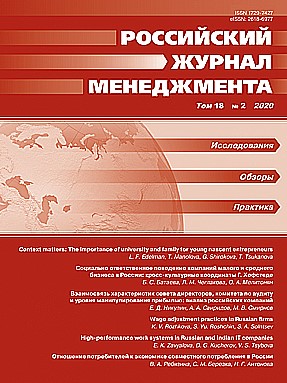Wage adjustment practices in Russian firms
DOI:
https://doi.org/10.21638/spbu18.2020.204Аннотация
Wage adjustments for employees are a reactive mechanism to changing market conditions and form a significant part of pay policy. Though various attempts to explore wage levels and wage differentials have been made, wage adjustment policies remain an understudied topic. This paper analyses the determinants of wage adjustments based on data from Russian companies 2015–2017. The analysis is based on detailed data from an employer survey which covers more than 5,000 firms in both the public and private sector. The study adopts probit models to identify the reasons for wage revisions, depending on internal employer characteristics and external labour market conditions. The results are in line with previous research on the topic and suggest that both internal and external factors influence wage adjustments. A wage adjustment is a reflection of an ability to pay, meaning that revisions are often made by successful firms with high employee turnover. Institutional frameworks, especially trade union activity, affects a firm’s decision to adjust wages, despite the widely-held opinion regarding the insignificance of unions in Russia. This study contributes to the limited literature by analysing the determinants of wage policies depending on a firm’s characteristics. This is the first study of its kind based on extensive Russian data.
Ключевые слова:
wage adjustment, pay policy, pay settlement, trade union, Russia
Скачивания
Библиографические ссылки
REFERENCES IN LATIN ALPHABET
Загрузки
Опубликован
Как цитировать
Выпуск
Раздел
Лицензия
Статьи журнала «Российский журнал менеджмента» находятся в открытом доступе и распространяются в соответствии с условиями Лицензионного Договора с Санкт-Петербургским государственным университетом, который бесплатно предоставляет авторам неограниченное распространение и самостоятельное архивирование.





